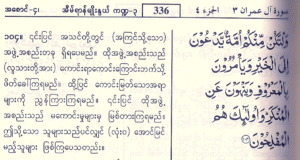UNITY IN DIVERSITY: A Pragmatic Call for Muslim Solidarity
“All for one. One for all.”
— A call not just for slogans, but for sincere, strategic unity among Myanmar Muslims.
We Must Embrace Unity Beyond Differences
Myanmar Muslims are a mosaic of ethnicities, sects, ideologies, and cultures. But our faith, history, and struggles call for unified action. Whether Deobandi or Tabligh, Sunni or Shia, Burmanized or Indianized—our strength lies in unity, not uniformity.
We must learn to forgive and collaborate, even when we disagree. If you cannot join another’s project, at least don’t sabotage it. If possible, find a way to use our different strengths for the common good.
A Change in Mindset Begins With Us
We often try to change others—but it’s harder and wiser to change ourselves first. That means:
- Accepting differences in attire, culture, or religious practice.
- Avoiding name-calling or public denouncements.
- Treating even former opponents as potential allies—if they are willing to work toward shared goals.
“If your enemy wants peace and justice, guide him, don’t destroy him.”
Our Approach to Non-Muslims Must Evolve
While Kafir is a theological term, using it in public creates walls. Let’s replace insult with inclusion. Call them “our beloved non-Muslim friends”—not as flattery, but as recognition of our shared humanity.
Look at:
- Rachel Corrie, a Jewish-American who gave her life in Gaza.
- Moshe Yegar, a Jewish diplomat and historian, who documented the plight of Myanmar Muslims with depth and empathy (The Muslims of Burma: A Study of a Minority).
- Christian clergy and aid workers who have sheltered or spoken up for Rohingyas and other Muslim victims.
- Hindu friends from India and beyond who condemned anti-Muslim violence and advocated harmony. Most prominent was Gandiji.
- Buddhist Monks like Dalai Lama, Asia Alin Yayng Sayardaw etc.
These are not just allies—they are moral lights across religious lines.
Stop the Purity Tests: We All Have Flaws
Many prominent Muslims have been misunderstood or unfairly vilified. I myself was harshly criticized as a “traitor” for suggesting a temporary compromise for Rohingya identity documentation, hoping it could later evolve into full recognition.
Likewise:
- The late Malavi U Hla Maung, a revered Ulama, was attacked for engaging in interfaith peace efforts.
- Former ambassador H.E. U Hla Maung was condemned for allegedly softening Muslim demands. But behind the scenes, he may have done more than most realize. He deserves diplomatic engagement, not destruction.
“We should never close the door to anyone who wants to return to the path of justice.”
Think Strategically, Not Emotionally
Criticizing or cancelling people may feel satisfying—but it weakens our cause. Instead:
- Engage with influence, even if we disagree with the individual.
- Keep channels open—whether with ambassadors, MPs, or religious figures.
- Use every possible bridge to the corridors of power, including respected Muslims close to the current government.
Final Appeal: Let’s Rethink Our Response
Instead of attacking those we differ with—talk to them. Persuade them. If they cannot change, let them be, but never resort to threats, violence, or slander.
If we practice this, we’ll rise from fragmented frustration to mature, powerful unity. That’s what our people—and our faith—demand of us today.
“Unity in Diversity is not a weakness—it is our best strategy for survival and progress.”
📢 Summary Points for Sharing:
- Forgive and cooperate across sects, races, and ideologies.
- Appreciate non-Muslim allies who support justice.
- Don’t attack; engage and guide.
- Change begins with ourselves.
- Use all available bridges for the Muslim cause in Myanmar.
- Pray, act wisely, and leave judgment to Allah.
Unus pro omnibus, omnes pro uno is a Latin phrase that means One for all, all for one. It is the unofficial motto of Switzerland, and the attitude is epitomized in the character of legendary Swiss hero Arnold von Winkelried. A French version, Un pour tous, tous pour un, was made famous by Alexandre Dumas in the 1844 novel The Three Musketeers.
In 1594, William Shakespeare uses it in his poem
The aim of all is but to nurse the life
With honour, wealth, and ease, in waning age;
And in this aim there is such thwarting strife,
That one for all, or all for one we gage;
As life for honour in fell battle’s rage;Honour for wealth;
and oft that wealth doth costThe death of all, and all together lost.







